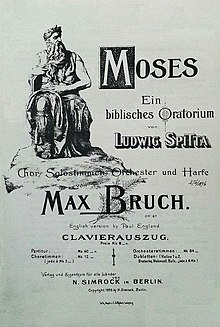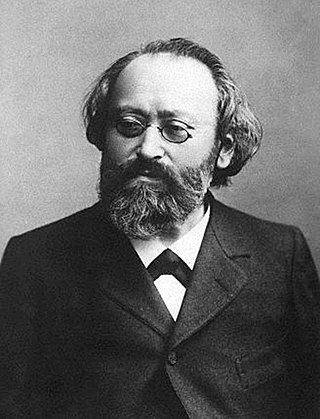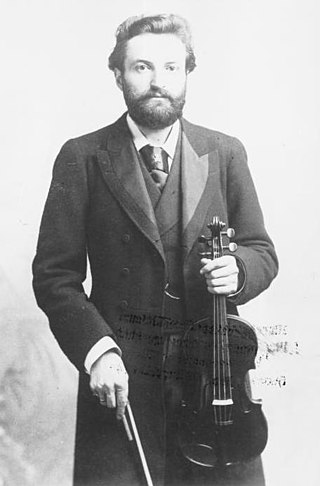
Moses: ein biblisches Oratorium, Op. 67 is an 1895 oratorio by Max Bruch, on a text by Ludwig Spitta for soprano, tenor, and bass. [1] [2] On 19 January 1895, Moses was premiered in Barmen under Bruch's direction. [3]

Moses: ein biblisches Oratorium, Op. 67 is an 1895 oratorio by Max Bruch, on a text by Ludwig Spitta for soprano, tenor, and bass. [1] [2] On 19 January 1895, Moses was premiered in Barmen under Bruch's direction. [3]

Max Bruch was a German Romantic composer, violinist, teacher, and conductor who wrote more than 200 works, including three violin concertos, the first of which has become a prominent staple of the standard violin repertoire.

Willy Hess was a German violinist and violin teacher.
Kol Nidrei, Op. 47, is a composition for cello and orchestra written by Max Bruch.

Martin Berkofsky was an American classical pianist, known primarily for his interpretations of music by Franz Liszt and Alan Hovhaness.

Max Bruch's Violin Concerto No. 1 in G minor, Op. 26, is one of the most popular violin concertos in solo violin repertoire and, along with the Scottish Fantasy, the composer's most famous work. It has been recorded often.
Moses was the reputed author of the Biblical Pentateuch and protagonist of the Book of Exodus.

Heinrich Picot de Peccaduc, Freiherr von Herzogenberg was an Austrian composer and conductor descended from a French aristocratic family.

Karl Otto Clemens Wittgenstein was a German-born Austrian steel tycoon. A friend of Andrew Carnegie, with whom he was often compared, at the end of the 19th century he controlled an effective monopoly on steel and iron resources within the Austro-Hungarian Empire, and had by the 1890s acquired one of the largest fortunes in the world. He was also the father of concert pianist Paul Wittgenstein, philosopher Ludwig Wittgenstein and of philanthropist Margaret Stonborough-Wittgenstein.

Max Bruch's Violin Concerto No. 2 in D minor, Op. 44 was composed during 1877, following a failed attempt in 1874, and dedicated to the great Spanish violinist, Pablo de Sarasate. It was premiered in London by Sarasate, conducted by Bruch, on 4 November 1877.

Bernhard Plockhorst was a German painter and graphic artist. In Germany, Plockhorst is mainly known to experts today, whereas his pictures are still very popular in the United States and their reproductions can be found in many American homes and churches.

Rose Sutro and Ottilie Sutro were American sisters who were notable as one of the first recognised duo-piano teams. It has been claimed they were the first such team, but Willi and Louis Thern preceded them by almost 30 years. They were also noted confidence tricksters, repeatedly swindling the German composer Max Bruch by taking advantage of his trusting nature - first, by making and publishing unauthorized changes to his Concerto for Two Pianos and Orchestra in A-flat minor, and second, stealing and absconding with the autograph copy of his Violin Concerto No. 1 in G minor, later selling it in 1949.

Robert Hausmann was a notable 19th-century German cellist who premiered important works by Johannes Brahms and Max Bruch. He was the cellist for the Joachim Quartet and taught at the Berlin Königliche Hochschule für Müsik.

Ludwig Emil Tomas Göransson is a Swedish composer, conductor, songwriter, and record producer.

Volker Bruch is a German television and film actor. He is best known internationally for his leading roles as Wilhelm Winter in the television drama Generation War (2013) and as Inspector Gereon Rath in the neo-noir series Babylon Berlin (2017–present); for the latter, he was awarded the 2018 Grimme-Preis, Germany's most prestigious television award. In film, he was part of the ensemble cast of two films nominated for Academy Awards in 2009: The Reader and The Baader Meinhof Complex ; more recently, he appeared in the thriller The Girl in the Spider's Web (2018) and Race for Glory: Audi vs. Lancia (2024).
Dietrich Kämper is a German musicologist.

Ludwig Anders Ahgren, known mononymously as Ludwig, is an American live streamer, YouTuber, podcaster, comedian, esports commentator, and competitor. Ahgren is best known for his live streams on Twitch from 2018 through late 2021, and on YouTube beginning in late 2021, where he broadcasts video-game-related content as well as non-video-game-related content such as game shows and contests. He is also known for his work as an esports commentator at various Super Smash Bros. Melee tournaments. He is the co-owner of the esports organization Moist Esports. He began streaming full-time on February 16, 2019.
Peter Lika is a German bass in opera and concert, focused on both oratorio singing as on historically informed performances.
This article lists notable compositions within the viola repertoire. The list includes works in which the viola is a featured instrument. The list is ordered by composer surname.
Max Bruch composed a number of choral works that were, during his lifetime, judged to be his most successful pieces. Instrumental music makes up only about a third of Bruch’s total output, while vocal music forms a considerably larger proportion. These works are described variously as oratorios and cantatas. His oratorios are generally held to represent the best of his vocal writing. Some were of a religious character but many were based on mythological themes.
Bruch saw Moses as the 'only great representative and preserver of monotheism'. That was how he delineated the character to Spitta.42 By early January 1894 Ludwig Spitta (the Hanover theologian and brother of Philipp) had accepted ...